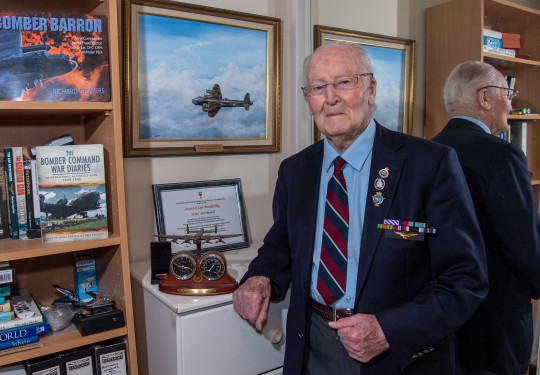85 years of service for Flying Officer Jack Marshall DFC
1939 –1944
Working as a tail gunner in Bomber Command during World War II, chances were high that Jack Marshall would not return home. However, after two tours and 46 missions, he did.
07 July, 2022
"The chance of survival was only one in three. In Bomber Command we lost more men than the British Army did. That makes you think, doesn’t it? I must be one of the luckiest guys in the world to have survived,” the 101-year-old said.
London-born, Mr Marshall moved to Napier in Hawke’s Bay as a teenager after his father retired as a telegraphist. He enlisted with the Royal New Zealand Air Force in December 1939 and flew out to Britain where he became part of the Royal Air Force.
“I joined for the adventure, I think. I had a sense of adventure at that age, I was only 19. Unfortunately the two young men I shared a cabin with didn’t come back. I joined as a tail gunner. I could have gone to a pilot’s course, but that meant something like six weeks in Canada and I didn’t fancy that.”
In his first tour, Mr Marshall was based at the Royal Air Force (RAF) base in Marham Norfolk, flying in Vickers Wellington aircraft. His second stint had him posted to an RAF base at Oakington, just outside of Cambridge, flying in Short Stirlings. During that tour, Mr Marshall flew alongside New Zealand flying great Fraser Barron, a pilot with Bomber Command.
“He was a wonderful guy. It was very sad when he was killed over Le Mans, in northwest France.”
Mr Marshall and Wing Commander Barron were members of the Pathfinder Force, who were responsible for going ahead of the main force and marking targets. The main force then would fly in and bomb the markers.
One mission, on a flight to Genoa in Italy, has always stuck with Mr Marshall.
“We were approaching the Alps and the plane started to ice up badly – of course that means you can’t climb very high.”
The crew decided to alter the course to find a pass to go through the range, which meant gaining about 40 minutes extra flying time.
“Anyway, we went down to Genoa and bombed German ships – the Germans were using Genoa for refuelling at the time. The exciting part was that as we touched down on our return to the base, three of the engines cut out. The ground staff were looking at it the next morning and reckoned we only had about three or four minutes left of fuel. That’s cutting it fine.”
Mr Marshall also lays claim to being one of the only airmen in the Air Force, “probably any air force” who swore at a Commanding Officer and got away with it.
“We were cruising along, going to Berlin I think, and we had this brass hat on board who was determined to see what it was like. He’s chatting away to the pilot and flak (anti-aircraft fire) was coming up. I was watching it and it was just about on my turret, so I had to do something, so I said: ‘for Christ’s sake shut up and put it into a diving turn skipper!’, and he put it into a diving turn and we got away from it. I often laugh about that.”
Another memorable part of the war for Mr Marshall was meeting his wife Molly.
“I met Molly at a place called Leigh-on-Sea in Essex. I took one look at her and thought, ‘I’m going to marry this girl’. We had 71 years of a wonderful marriage. Unfortunately she died about nine years ago.
“We had a wonderful partnership. We’ve got three kids, six grandchildren and six great-grandchildren.”
Returning with Molly to New Zealand after finishing his deployment in 1944, Mr Marshall thought he had come away unscathed. But it turns out the battle scars ran deep.
“We were visiting my parents in Wellington and dad had a go at me because I hadn’t written to my cobber’s mother. I said I hadn’t written yet and he said, ‘Well you ought to be ashamed of yourself’. And my Adam’s apple came up and I ran out to the kitchen and sobbed like a baby. I had no idea I was affected that way.”
In 1943 Mr Marshall was awarded a Distinguished Flying Cross. The citation for the award read: “A keenness and desire to engage the enemy were qualities displayed at all times by Flying Officer Jack Marshall”.
Next month Mr Marshall will turn 102.
“I’d be one of the oldest veterans, I suppose. I don’t know how many of us there are left – we’re getting pretty thin.”
